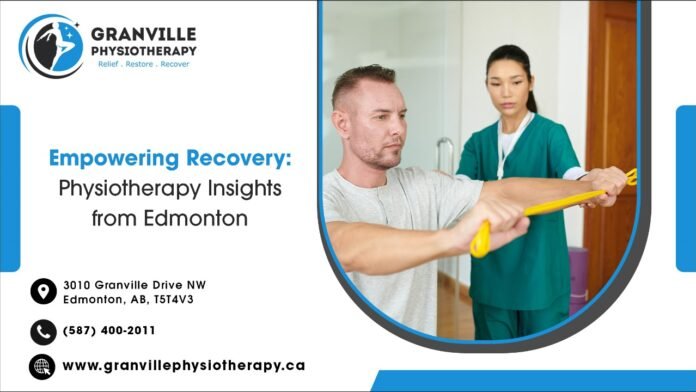Last Updated on March 12, 2024 by admin
In the heart of Edmonton, physiotherapy stands as a beacon of hope for individuals navigating the journey to recovery. This post delves into the transformative power of physical therapy, spotlighting the innovative approaches and personalized care provided by clinics like Granville Physiotherapy. Here, we explore how physiotherapy in Edmonton is empowering individuals to overcome their challenges and reclaim their health and mobility.
Table of Contents
The Essence of Physiotherapy in Edmonton
Physiotherapy, or physical therapy, as it’s known in some regions, is a holistic approach to healthcare that addresses a wide range of physical ailments. In Edmonton, physiotherapy clinics employ a multifaceted approach, combining traditional techniques with cutting-edge technology to tailor treatments to each patient’s unique needs. From sports injuries and chronic pain management to post-surgical rehabilitation, physiotherapists in Edmonton are dedicated to enhancing patients’ quality of life.
1. Pain Management
Physiotherapy takes a multifaceted approach to pain management, utilizing methods like manual therapy to manipulate soft tissues and joints and modalities such as ultrasound or TENS to reduce pain signals. Therapists also employ exercise to improve strength and flexibility, which can alleviate chronic pain conditions. By addressing the root cause of pain, physiotherapy provides a sustainable solution, helping patients reduce dependency on medications. This holistic approach not only eases discomfort but also empowers patients with knowledge and techniques to manage pain in their daily lives, significantly improving their overall well-being.
2. Restoring Mobility and Flexibility
Restoring mobility and flexibility is a primary focus of physiotherapy, especially for patients recovering from injuries or surgeries that limit movement. Through a series of personalized stretching and strengthening exercises, physiotherapists help patients gradually regain their range of motion. Joint mobilizations and soft tissue massage further assist in loosening tight muscles and improving flexibility. This aspect of physiotherapy is crucial for enhancing the ability to perform daily activities and maintaining an active lifestyle, ultimately leading to a better quality of life.
3. Strengthening Muscles
Strengthening muscles is essential for both injury recovery and prevention. Physiotherapy employs targeted exercises that focus on specific muscle groups, enhancing strength and endurance without overstraining the recovering area. This process not only supports the injured site but also contributes to the stability and functionality of surrounding areas, preventing compensatory injuries. For patients, stronger muscles mean improved performance in daily tasks and reduced risk of future injuries, making this aspect of physiotherapy invaluable for long-term health and mobility.
4. Improving Balance and Coordination
Improving balance and coordination is critical for preventing falls and enhancing overall physical performance. Physiotherapy utilizes balance training exercises, which include standing on a single leg or walking on uneven surfaces, to challenge and improve the body’s balance systems. Coordination exercises, often incorporating balls or other equipment, help refine motor skills and body awareness. These activities are particularly beneficial for elderly patients and those recovering from neurological conditions, helping them achieve greater independence and confidence in their movements.
5. Post-operative Rehabilitation
Post-operative rehabilitation through physiotherapy is tailored to help patients recover after surgery. By designing specific exercise programs, physiotherapists aid in restoring strength, flexibility, and function to the surgical area. This proactive approach improves the healing process and helps minimize the risk of complications, which include stiffness or scar tissue formation. Education on proper movement techniques and activity modification further supports a successful recovery, ensuring patients can return to their daily activities safely and effectively.
6. Chronic Disease Management
Physiotherapy helps in the management of chronic diseases by encouraging physical activity and teaching self-management techniques. Through exercises tailored to each condition, patients can control symptoms, improve mobility, and enhance their overall health. This active approach to chronic disease management could lead to a reduction in medication use and healthcare visits, empowering patients to take control of their health. Additionally, physiotherapists provide valuable education on lifestyle changes that support disease management, fostering a sense of autonomy and well-being.
7. Neurological Rehabilitation
Neurological rehabilitation through physiotherapy targets the unique challenges faced by individuals with neurological conditions. By employing exercises that promote motor control, balance, and functional movement, therapists help patients regain skills affected by their condition. This specialized form of rehabilitation is crucial for maximizing independence and enhancing quality of life. Gait training and balance exercises are tailored to each patient’s abilities and goals, providing a pathway to recovery that respects the complexities of neurological conditions.
8. Sports Injury Recovery
Recovering from sports injuries requires a focused and comprehensive approach that physiotherapy provides. Manual therapy, exercise, and education on injury prevention help athletes heal properly and return to their sport stronger. This targeted rehabilitation not only addresses the current injury but also implements strategies to prevent future occurrences, optimizing athletes’ performance and resilience. The personalized care and attention to detail in sports physiotherapy ensure athletes of all levels can achieve their peak physical condition and competitive goals.
9. Enhancing Cardiovascular and Pulmonary Health
Physiotherapy contributes significantly to cardiovascular and pulmonary health by promoting exercises that improve endurance, strength, and breathing techniques. For patients with heart and lung conditions, tailored exercise programs can improve circulation, reduce breathlessness, and enhance overall stamina. This active approach to managing cardiovascular and pulmonary conditions supports a healthier lifestyle, reducing symptoms and improving patients’ ability to engage in their routine activities. Education on energy conservation and breathing strategies further empowers patients to manage their conditions effectively.
A Beacon of Hope in Edmonton’s Healthcare Landscape
Physical therapy in Edmonton, exemplified by the comprehensive care at Granville Physiotherapy, is an example of the city’s commitment to advancing healthcare and improving the lives of its residents. By embracing innovative treatments, personalized care, and a patient-centred philosophy, physiotherapy in Edmonton is empowering individuals to navigate their recovery journeys with confidence and resilience. As the field continues to evolve, it remains a cornerstone of Edmonton’s healthcare system, offering hope and healing to those in need.























